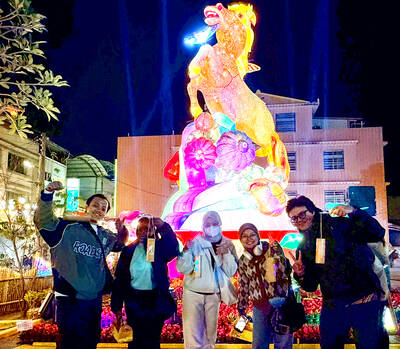Popular film Your Name Engraved Herein has won much acclaim since its premiere in late September. The film, starring actors Tseng Jing-hua and Edward Chen, is a bittersweet romance between two high school boys in the late 1980s. It has grossed nearly NT$100 million (about US$3.5 million), becoming the most-watched Taiwanese movie this year, and the best-selling LGBT-themed movie in Taiwan’s history.
The film is nominated for five nods at the upcoming Golden Horse Awards, including Best Original Film Song award, while the theme song, performed by Crowd Lu, has recently gone viral online. To express their appreciation to fans, the cast participated in the 18th “Taiwan LGBT Pride” parade in Taipei on Saturday last week, and showed support to the LGBT community by action.
Meanwhile, director Haruo Sotozaki’s animated film Demon Slayer: Mugen Train smashed the Japanese box office last week by crossing the 10 billion yen (about US$95.9 million) benchmark in just 10 days. The previous record was set by director Hayao Miyazaki’s classic anime Spirited Away, which took 25 days to achieve this in 2001.

Photo: Wang Wen-lin, Liberty Times 照片︰自由時報王文麟
(Eddy Chang, Taipei Times)
熱門電影《刻在你心底的名字》自九月底上映後好評不斷,該片由演員曾敬驊、陳昊森主演,是一九八○年代末期,兩位高中男生甜蜜又苦澀的愛情故事。目前票房已逼近台幣一億大關(將近三百五十萬美元),是今年最受歡迎國片,並榮登台灣影史最賣座同志主題電影。
該片在即將登場的金馬獎獲五項提名,包括原創電影歌曲獎。由歌手盧廣仲所演唱的主題曲,近日更在網路上爆紅。為表達對粉絲的感謝,演員們於上週六還參加了在台北市所舉行的第十八屆「台灣同志遊行」,用行動力挺同志族群。

Photo copied by Chung Chih-chun, Liberty Times 照片︰自由時報鍾志均翻攝
而導演外崎春雄推出的動畫強片《鬼滅之刃無限列車篇》,上週亦打破日本票房,只花了十天即跨越百億日元票房大關(約九千五百多萬美元)。之前紀錄是由導演宮崎駿的經典動畫《神隱少女》所創下,該片於二○○一年花了二十五天才突破百億票房門檻。
(台北時報張聖恩)

The Lantern Festival, celebrated on the 15th day of the first lunar month, is one of the most important traditional festivals in Chinese culture. The word yuan means “first,” and xiao means “night,” referring to “the first full moon night of the lunar year.” In 2026, the Lantern Festival falls on March 3 in the Gregorian calendar. Also known as the Shangyuan Festival or Festival of Lights, the Lantern Festival marks the festive conclusion of the two-week Lunar New Year period. It symbolizes hopes for brightness, peace and reunion in the year ahead. On this day, people traditionally enjoy lantern displays, riddle-guessing

A: Harvard professor Robert Waldinger’s “7-day Happiness Challenge” includes: Day 1: Take stock of your relationships; Day 2: The secret power of an 8-minute phone call; Day 3: Small talk with strangers has big benefits. B: That’s not too hard. What’s next? A: Day 4: Why you should write a “living eulogy;” Day 5: The importance of making work friends; Day 6: Don’t cancel those social plans. B: Good ideas. What’s the final challenge? A: Day 7: Keep happiness going all year long. So, I’m inviting some friends to the Taipei Lantern Festival today to build good relationships. Wanna

A: Happy Lunar New Year. I wish you joy and health in the Year of the Horse. B: Thanks, you too. Actually, the Harvard Study of Adult Development claims that they’ve finally discovered the secret to living a happy life after 85 years of research. A: What is it? Money? Fame? Career? B: Nope, the key is good relationships. Professor Robert Waldinger, the principal investigator, portrays one’s relationships as “social fitness,” and has worked with the New York Times to launch the “7-day Happiness Challenge.” A: I wanna be socially fit. How can I participate in this challenge? A:

Steam curls from a shallow iron pot as thin ribbons of beef turn from ruby to blush. Warishita — a mixture of soy sauce, sugar and mirin — goes in, and the room fills with a salty-sweet aroma. Tofu slips in beside mushrooms and greens, chopsticks hover and voices soften. More than a hot pot, “sukiyaki” is a table-side ritual that invites everyone to cook and enjoy at the same pace. The name is believed to be associated with the iron “suki,” a kind of spade once used by farmers for cooking and later replaced by shallow pots. As cultural taboos